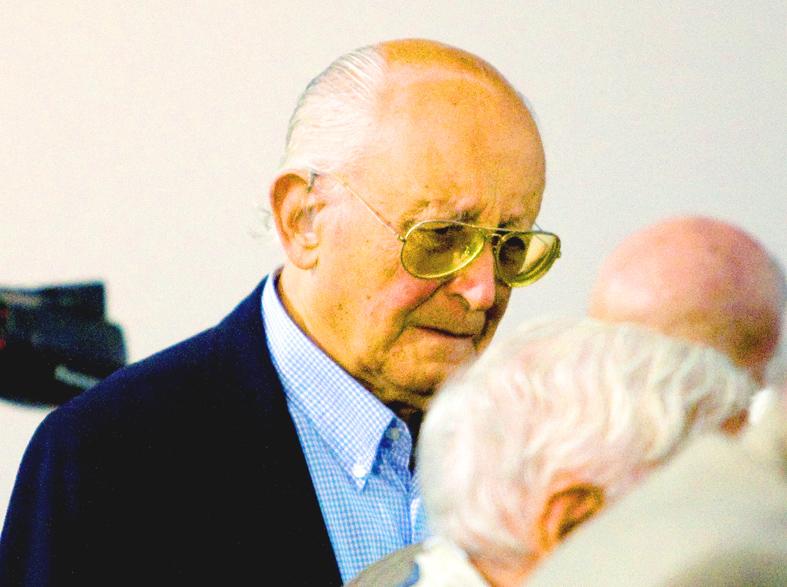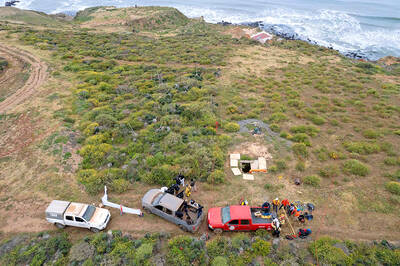An Argentine court on Wednesday sentenced 10 former members of the military and police to life in prison for crimes committed during the South American country’s military regime.
They were found guilty of homicide, kidnapping, torture and rape in a trial known as the “Campo de Mayo mega-case,” after the name of the military base where the crimes occurred.
The defendants watched the reading of the unanimous court decision via videoconference, while the courtroom was filled with relatives of those affected and members of human rights organizations.

Photo: Reuters
Among the 350 people caught up in the incidents at the Campo de Mayo military base were 14 pregnant women whose children were stolen.
Grandmothers of Plaza de Mayo estimated that during the period, about 400 babies were born in captivity and illegally handed over to other people.
Only about one-third have discovered the identity of their original family.
The list of people affected also included many workers and union delegates from factories in an industrial zone north of Buenos Aires, including those of German automaker Mercedes Benz and Ford Motor Co of the US.
The trial began in 2019 and was mostly held virtually due to the COVID-19 pandemic.
Initially there were 22 defendants, but two died during the proceedings.
Most had already been convicted in other trials for crimes against humanity.
Former general Santiago Riveros, 98, was the most senior officer sentenced on Wednesday to life imprisonment, albeit to be served under house arrest.
Riveros was also given a life sentence on Monday, along with three other soldiers, for his role in the so-called “death flights,” in which drugged detainees were thrown into the ocean from planes that had taken off from Campo de Mayo.
Since laws granting amnesty for crimes committed under the military regime were annulled in 2006, 278 sentences have been handed down for crimes against humanity across the country, with 1,070 people convicted, many of whom were sentenced to life imprisonment.

MONEY MATTERS: Xi was to highlight projects such as a new high-speed railway between Belgrade and Budapest, as Serbia is entirely open to Chinese trade and investment Serbian President Aleksandar Vucic yesterday said that “Taiwan is China” as he made a speech welcoming Chinese President Xi Jinping (習近平) to Belgrade, state broadcaster Radio Television of Serbia (RTS) said. “We have a clear and simple position regarding Chinese territorial integrity,” he told a crowd outside the government offices while Xi applauded him. “Yes, Taiwan is China.” Xi landed in Belgrade on Tuesday night on the second leg of his European tour, and was greeted by Vucic and most government ministers. Xi had just completed a two-day trip to France, where he held talks with French President Emmanuel Macron as the

With the midday sun blazing, an experimental orange and white F-16 fighter jet launched with a familiar roar that is a hallmark of US airpower, but the aerial combat that followed was unlike any other: This F-16 was controlled by artificial intelligence (AI), not a human pilot, and riding in the front seat was US Secretary of the Air Force Frank Kendall. AI marks one of the biggest advances in military aviation since the introduction of stealth in the early 1990s, and the US Air Force has aggressively leaned in. Even though the technology is not fully developed, the service is planning

INTERNATIONAL PROBE: Australian and US authorities were helping coordinate the investigation of the case, which follows the 2015 murder of Australian surfers in Mexico Three bodies were found in Mexico’s Baja California state, the FBI said on Friday, days after two Australians and an American went missing during a surfing trip in an area hit by cartel violence. Authorities used a pulley system to hoist what appeared to be lifeless bodies covered in mud from a shaft on a cliff high above the Pacific. “We confirm there were three individuals found deceased in Santo Tomas, Baja California,” a statement from the FBI’s office in San Diego, California, said without providing the identities of the victims. Australian brothers Jake and Callum Robinson and their American friend Jack Carter

CUSTOMS DUTIES: France’s cognac industry was closely watching the talks, fearing that an anti-dumping investigation opened by China is retaliation for trade tensions French President Emmanuel Macron yesterday hosted Chinese President Xi Jinping (習近平) at one of his beloved childhood haunts in the Pyrenees, seeking to press a message to Beijing not to support Russia’s war against Ukraine and to accept fairer trade. The first day of Xi’s state visit to France, his first to Europe since 2019, saw respectful, but sometimes robust exchanges between the two men during a succession of talks on Monday. Macron, joined initially by EU Commission President Ursula von der Leyen, urged Xi not to allow the export of any technology that could be used by Russia in its invasion